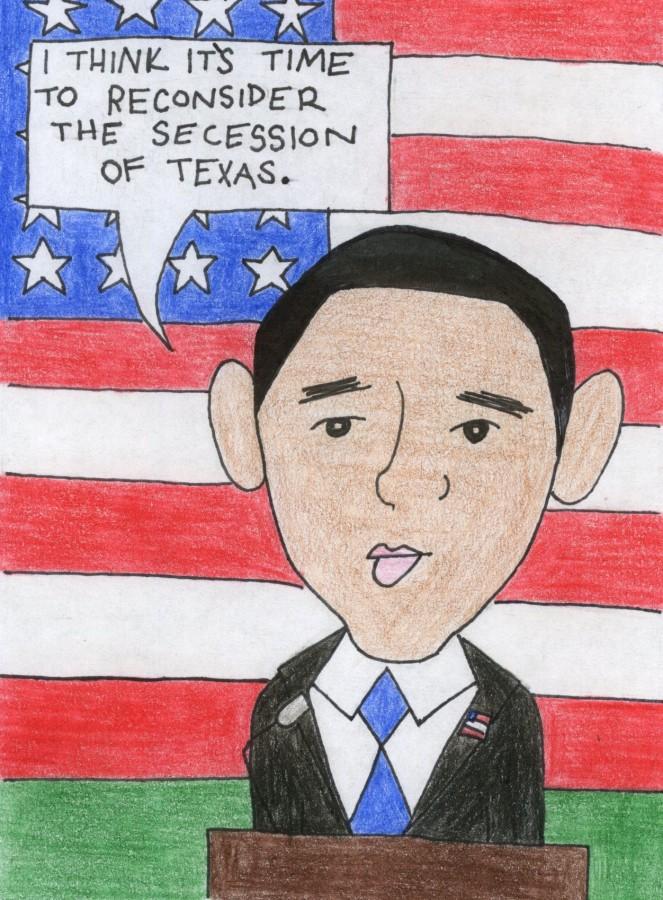Sekerci: Better strategies needed in fight against Ebola
At a press conference, Obama addresses the Ebola outbreak in Dallas.
October 14, 2014
“I will say that in the 30 years I’ve been working in public health, the only thing like this has been AIDS.”
These words were said by the Director of the U.S. Centers for Disease Control and Prevention, Dr. Thomas Frieden. The ‘thing’ he mentioned is Ebola, which has crippled three countries in Africa and has put fear into the hearts of many around the globe.
Let’s get our facts straight: The current Ebola outbreak has spread to five countries, infected more than 8,300 people and killed 4,033, as of Oct. 8. Two cases have been reported in the U.S. as of Oct. 11. Both are in Dallas, Texas. One patient, Thomas Eric Duncan, was hospitalized eight days after arriving on U.S. soil. Duncan was infected while living in Liberia and died in Dallas on Oct. 8. The second case is Nina Pham, the nurse who took care of Duncan while he was hospitalized. She is currently being treated in Dallas.
Ebola is a problem for everyone. Even though Liberia and Sierra Leone have had the most deaths from Ebola, it is not just the problem of those countries. The efforts of these countries’ governments are not enough, since they have neither the technology nor the money to fight the disease. The World Health Organization, United Nations and many countries in the world are sending scientists, volunteers and money to these countries with the hope that the situation will sort itself out, but that has not happened yet. Yes, Ebola cases have slowed down. In fact, the UN special envoy David Nabarro told the BBC that there are less cases each day than the day before, and the outbreak could be under control in three months. This is an optimistic estimate if we acknowledge the fact that the African governments aren’t really acting in an organized fashion.
All the resources coming in are not regulated well enough to be used efficiently. The governments of Liberia and Sierra Leone are trying to fight the disease while in a state of panic, which doesn’t create great results. Even though Liberia is already in a state of emergency, President Ellen Johnson Sirleaf has asked for even more powers in an attempt to control the situation, including the ability to confiscate private property and cancel the elections.
The House of Representatives voted against this proposal, arguing that the state of emergency is enough to solve the situation. I concur that more power will not be helpful in fighting the disease. Liberia’s government should be more organized and should also put more effort in regulating the aid that they are getting from outside.
One example is the fact that Duncan came to the U.S. while carrying the disease. He should not have been allowed to leave the country in the first place. Liberia’s only safety measure is to ask people leaving the country whether or not they have come into contact with anyone who had Ebola. Duncan lied in answering “no” and was allowed to fly to the U.S. Liberia should increase these safety measures so they won’t jeopardize people in other countries.
Another proposal made purely out of panic was to terminate all flights to and from the infected countries. One advocate of this proposal, congressman Joe Barton (R-Texas), told CBS that President Obama has not put adequate effort into solving the issue of Ebola. The CDC strongly disagreed with this proposal at a hearing in Dallas, saying terminating all flights, rather than helping the situation, would make fighting the outbreak more difficult.
Although terminating all flights would eliminate the mistakes of the governments of Ebola-stricken countries, it wouldn’t come close to being a solution for Ebola. The economic effects would be enormous, not to mention the psychological effects. The people would feel isolated, as if the world has turned its back to them.
As much as we fear Ebola, we shouldn’t let panic get in the way of fighting it. With more thoughtful actions by the African governments and with the help of the UN and WHO, Ebola can be eradicated. Everyone knows that fighting Ebola is not easy, but with meticulous planning, an organization can bring out the best possible solution there is.
Burak Sekerci is a McCormick sophomore. He can be reached at [email protected]. If you would like to respond publicly to this column, send a Letter to the Editor to [email protected].


